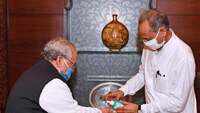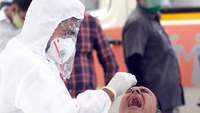
“My 65-year-old father is a diabetic with high blood pressure, and his sugar level would sometimes shoot over the roof, mostly during the odd hours of the night. On one such occasion, we had to wait until daybreak for the doctor to arrive and treat his condition.”
“My 68-year old mother is a cancer patient, and also suffers from other life-threatening conditions. Though she is being treated for her Covid infection, I am worried that management of her underlying conditions may get neglected.”
Notwithstanding the laudable work put in by frontline healthcare workers at the ESI-Covid hospital in Margao, the above two cases — one of a patient who has since recovered and been discharged, the other of one undergoing treatment — project a picture of the inadequacies affecting the patient care system for those with comorbid conditions.
The state has seen 43 Covid-19 deaths so far, of which 34 occurred at the Covid hospital. Of these 34, over 88% — or 30 — were found to have had comorbidities or underlying medical conditions such as diabetes, high blood pressure, heart problem or a kidney ailment.
While the government has been quick to defend the spurt in deaths to the patients’ comorbid conditions, governor Satya Pal Malik found the defence unconvincing, and had recently even given chief minister Pramod Sawant a piece of his mind.
Malik also underscored the need for comprehensive treatment for patients with comorbidities.
“If a cancer patient gets Covid and it sent to the Covid hospital, he is treated with paracetamol tablets,” Malik had told TOI. “This cannot continue. I have given clear instructions to the government to treat patients with comorbidities properly and not put them under a similar treatment like the other patients.”
The issue has again come to the fore after Shirley (name changed to protect identity), daughter of a cancer patient, wrote to health authorities pointing out how her mother’s medical history and advanced cancer necessitated a treatment regimen that is specific to her underling conditions. “Her medical condition requires that she is seen by a team of oncologists and general medicine practitioners besides Covid doctors, before a specific line of treatment for her is decided,” she told TOI. “However, this cannot be done at the ESI hospital owing to the severely-inadequate doctor-patient ratio. Consequently, patients remain unattended, especially at a time when their condition suddenly worsens, as in the case of cancer patients in advanced stages.”
Sources at ESI, however, said that there should be no problem if a consultant wishes to visit the patient on request, provided all Covid protocols are followed. State health secretary Nila Mohanan stressed that patients with comorbid conditions were always given “top priority” at the Covid hospital.
“Many chronic kidney patients have been given dialysis regularly, and are continuing to get it,” she told TOI. “Heart patients have been checked by senior consultants from GMC as and when the need has arisen. Chemotherapy is not something that can be done at a non-cancer specialty hospital, and so that is not being done. Generally, all aggressive chemotherapy is kept on hold during the acute active phase of Covid.”
Shirley, nevertheless, has suggested that in order to ensure some degree of comfort to patients with comorbid conditions, they be categorized based on the degree of their severity, and housed in a separate ward with a team of dedicated doctors working round-the-clock in shifts. “They need to put in place a setup for Covid patients with comorbidities that would ensure the best of comfort and care for them,” she said.
In her letter, which she also copied to health minister Vishwajit Rane, she also pointed out that owing to insufficient patient attendants at the Covid hospital, immobile patients — who need assistance even for personal hygiene — suffer the most.
Chief minister Pramod Sawant, after visiting the ESI hospital on Tuesday, had said that a crunch in paramedical and housekeeping staff, coupled with reluctance of the patients’ kin to stay in the hospital to care for them, meant stretching the workload on existing staff to the limit, thereby affecting service quality. He also said that the patients at the hospital would be able to get personalised care if their kin stayed with them at the hospital or arranged a private attendant.
“It has been observed that Covid patients who do not have other underlying illnesses are recovering quickly, but the condition of those with comorbidities deteriorates faster,” said a senior health department official. “It’s imperative that our focus should now shift towards comorbid patients to reduce the death rate.”
“My 68-year old mother is a cancer patient, and also suffers from other life-threatening conditions. Though she is being treated for her Covid infection, I am worried that management of her underlying conditions may get neglected.”
Notwithstanding the laudable work put in by frontline healthcare workers at the ESI-Covid hospital in Margao, the above two cases — one of a patient who has since recovered and been discharged, the other of one undergoing treatment — project a picture of the inadequacies affecting the patient care system for those with comorbid conditions.
The state has seen 43 Covid-19 deaths so far, of which 34 occurred at the Covid hospital. Of these 34, over 88% — or 30 — were found to have had comorbidities or underlying medical conditions such as diabetes, high blood pressure, heart problem or a kidney ailment.
While the government has been quick to defend the spurt in deaths to the patients’ comorbid conditions, governor Satya Pal Malik found the defence unconvincing, and had recently even given chief minister Pramod Sawant a piece of his mind.
Malik also underscored the need for comprehensive treatment for patients with comorbidities.
“If a cancer patient gets Covid and it sent to the Covid hospital, he is treated with paracetamol tablets,” Malik had told TOI. “This cannot continue. I have given clear instructions to the government to treat patients with comorbidities properly and not put them under a similar treatment like the other patients.”
The issue has again come to the fore after Shirley (name changed to protect identity), daughter of a cancer patient, wrote to health authorities pointing out how her mother’s medical history and advanced cancer necessitated a treatment regimen that is specific to her underling conditions. “Her medical condition requires that she is seen by a team of oncologists and general medicine practitioners besides Covid doctors, before a specific line of treatment for her is decided,” she told TOI. “However, this cannot be done at the ESI hospital owing to the severely-inadequate doctor-patient ratio. Consequently, patients remain unattended, especially at a time when their condition suddenly worsens, as in the case of cancer patients in advanced stages.”
Sources at ESI, however, said that there should be no problem if a consultant wishes to visit the patient on request, provided all Covid protocols are followed. State health secretary Nila Mohanan stressed that patients with comorbid conditions were always given “top priority” at the Covid hospital.
“Many chronic kidney patients have been given dialysis regularly, and are continuing to get it,” she told TOI. “Heart patients have been checked by senior consultants from GMC as and when the need has arisen. Chemotherapy is not something that can be done at a non-cancer specialty hospital, and so that is not being done. Generally, all aggressive chemotherapy is kept on hold during the acute active phase of Covid.”
Shirley, nevertheless, has suggested that in order to ensure some degree of comfort to patients with comorbid conditions, they be categorized based on the degree of their severity, and housed in a separate ward with a team of dedicated doctors working round-the-clock in shifts. “They need to put in place a setup for Covid patients with comorbidities that would ensure the best of comfort and care for them,” she said.
In her letter, which she also copied to health minister Vishwajit Rane, she also pointed out that owing to insufficient patient attendants at the Covid hospital, immobile patients — who need assistance even for personal hygiene — suffer the most.
Chief minister Pramod Sawant, after visiting the ESI hospital on Tuesday, had said that a crunch in paramedical and housekeeping staff, coupled with reluctance of the patients’ kin to stay in the hospital to care for them, meant stretching the workload on existing staff to the limit, thereby affecting service quality. He also said that the patients at the hospital would be able to get personalised care if their kin stayed with them at the hospital or arranged a private attendant.
“It has been observed that Covid patients who do not have other underlying illnesses are recovering quickly, but the condition of those with comorbidities deteriorates faster,” said a senior health department official. “It’s imperative that our focus should now shift towards comorbid patients to reduce the death rate.”

Coronavirus outbreak
Trending Topics
LATEST VIDEOS
City
 Shocking: Youth thrashed, made to drink urine over ‘illicit affair’ in Rajasthan's Barmer
Shocking: Youth thrashed, made to drink urine over ‘illicit affair’ in Rajasthan's Barmer  Unlock 3: Hotels to open August 1, gyms decision next week in Delhi
Unlock 3: Hotels to open August 1, gyms decision next week in Delhi  Rajasthan resort politics: Gehlot camp MLAs to be shifted to another hotel in Jaisalmer
Rajasthan resort politics: Gehlot camp MLAs to be shifted to another hotel in Jaisalmer  Herd immunity cannot be a strategic choice or option for India, says Centre
Herd immunity cannot be a strategic choice or option for India, says Centre
More from TOI
Navbharat Times
Featured Today in Travel
Quick Links
Kerala Coronavirus Helpline NumberHaryana Coronavirus Helpline NumberUP Coronavirus Helpline NumberBareilly NewsBhopal NewsCoronavirus in DelhiCoronavirus in HyderabadCoronavirus in IndiaCoronavirus symptomsCoronavirusRajasthan Coronavirus Helpline NumberAditya ThackerayShiv SenaFire in MumbaiAP Coronavirus Helpline NumberArvind KejriwalJammu Kashmir Coronavirus Helpline NumberSrinagar encounter
Get the app



